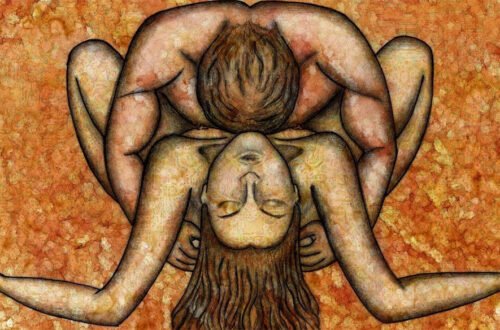
The role of experience in casting a love spell
What is esotericism?
Esotericism refers to a broad range of ideas and practices that are often considered to be mystical, spiritual, or metaphysical in nature. The term “esotericism” is derived from the Greek word “esotericos,” which means “inner,” and was originally used to describe teachings that were only accessible to a select group of people. Esotericism is often associated with secret knowledge, hidden wisdom, and occult practices, and is found in various cultures throughout history. One of the key features of esotericism is its focus on inner or spiritual experiences. Esoteric teachings often emphasize the importance of personal transformation, spiritual growth, and the attainment of higher levels of consciousness. This can involve practices such as meditation, visualization, and energy work, as well as the use of divination tools like tarot cards, astrology, and numerology. Esotericism also frequently involves the study of ancient texts and symbols, which are believed to contain hidden meanings and insights into the nature of reality. Esotericism can be seen as a reaction to the dominant religious and philosophical traditions of a given time and place. For example, in ancient Greece, esotericism emerged as a response to the rational and materialistic philosophy of the Stoics and Epicureans. In medieval Europe, esotericism was often associated with Christianity, and included practices such as alchemy, which sought to transform base metals into gold as a metaphor for spiritual transformation. During the Renaissance, esotericism was closely connected with the rediscovery of ancient Greek and Egyptian texts, which were believed to contain hidden wisdom and knowledge. One of the most famous esoteric traditions is that of Hermeticism, which emerged in Alexandria, Egypt, in the first century CE. Hermeticism is based on the teachings of the legendary figure Hermes Trismegistus, who was believed to be a combination of the Greek god Hermes and the Egyptian god Thoth. Hermeticism emphasizes the unity of all things and the importance of personal transformation through spiritual practices. It also emphasizes the idea that the universe is governed by certain laws or principles, which can be understood and harnessed through the study of symbols and correspondences. Another important esoteric tradition is Kabbalah, which is a form of Jewish mysticism that emerged in the Middle Ages. Kabbalah is based on the belief that the Torah contains hidden meanings and insights into the nature of God and the universe. Kabbalistic teachings emphasize the importance of meditation, prayer, and the use of mystical symbols and practices in order to attain spiritual enlightenment. Esotericism has also been a significant influence on modern occult practices, including various forms of witchcraft, neo-paganism, and new age spirituality. These practices often draw on a variety of esoteric traditions, including Hermeticism, Kabbalah, and alchemy, as well as other mystical and spiritual traditions from around the world. One of the challenges of studying esotericism is that it can be difficult to separate fact from fiction. Many esoteric traditions are based on ancient texts and teachings that have been passed down through generations, and it can be difficult to determine which parts are based on actual historical events and which are simply myth or legend. Additionally, many esoteric practices involve subjective experiences and personal interpretations, which can make it difficult to assess their validity or effectiveness. Despite these challenges, esotericism continues to be an important and influential aspect of spiritual and philosophical thought. Its emphasis on personal transformation and spiritual growth, as well as its focus on hidden knowledge and wisdom, continue to inspire people around the world to explore the mysteries of the universe and the nature of their own consciousness.
How does love magic work?
Love magic is a type of magic that is intended to influence the emotions and desires of a person in order to make them fall in love or desire someone. Love magic has been practiced for thousands of years in various cultures around the world, and it can take many forms, including spells, charms, potions, and rituals. The basic premise of love magic is that it uses the power of intention and energy to create a desired outcome. Practitioners of love magic believe that everything in the universe is connected through energy, and that by manipulating that energy, they can influence the thoughts and feelings of others. One of the most common types of love magic is spellcasting. Spells can take many forms, but they generally involve the use of words, symbols, and actions to create a desired effect. For example, a spell may involve lighting candles, reciting specific words or phrases, and using specific herbs or oils. Another common form of love magic is the use of charms or amulets. These objects are believed to have magical properties that can help attract love and romance. Charms and amulets can be made from a variety of materials, including gemstones, metals, and natural objects like herbs or animal parts. Potions are also often used in love magic. These are typically concoctions made from herbs, oils, and other ingredients that are believed to have magical properties. They may be ingested or applied topically, and are intended to influence the emotions and desires of the person consuming them. Love magic can also involve the use of rituals, which may involve chanting, dancing, or other actions that are intended to create a particular energy or atmosphere. These rituals may be performed alone or in groups, and can be as simple or complex as the practitioner desires.
The role of experience in casting a love spell
Love spells have been practiced for centuries by people seeking to attract, enhance or restore romantic relationships. These spells are believed to have the power to influence the emotions and thoughts of the intended target, making them fall in love or rekindle feelings for the caster. However, the effectiveness of a love spell is heavily reliant on the experience and expertise of the caster. In this article, we explore the role of experience in casting a love spell.
What is a love spell?
A love spell is a form of magic used to influence the emotions and feelings of an individual towards another person. It is usually cast with the intention of attracting love, enhancing an existing relationship or reconciling a broken one. Love spells can be cast using various materials and methods, including candles, herbs, crystals, and incantations. The effectiveness of the spell depends on various factors, including the caster’s experience, the strength of their intention, and the willingness of the target to accept the spell’s effects.
The Role of Experience
Experience is an essential factor in casting a love spell. Experienced casters have a deeper understanding of the energies involved in love spells and can use this knowledge to enhance the effectiveness of their spells. They have a more profound understanding of the rituals, materials, and methods involved in casting a love spell and can adjust them to suit the individual needs of their clients. Experienced casters also have a better understanding of the potential consequences of casting a love spell. They know that the effects of a love spell can be powerful and long-lasting, and they advise their clients accordingly. They will only cast spells when they are sure that the intentions of the client are pure and that the spell will not harm anyone involved. An experienced caster will also know when not to cast a spell. They understand that sometimes a spell is not necessary, and a more practical solution may be more effective. They will not cast a spell simply because the client requests it, but will instead provide guidance and advice on the best course of action. Experience also allows a caster to work with more complex and challenging cases. Love spells can be challenging to cast, especially when dealing with stubborn or resistant targets. An experienced caster knows how to deal with such situations and can adjust their methods to overcome any obstacles. Experience also allows a caster to work more efficiently. They have developed a system that works for them, and they can cast spells quickly and accurately. They know how to harness their energy and focus their intention, which allows them to achieve their desired results more quickly.
Conclusion
Experience plays a significant role in casting a love spell. An experienced caster has a deeper understanding of the energies involved in love spells and can use this knowledge to enhance the effectiveness of their spells. They know when to cast a spell, when not to, and can work with more complex and challenging cases. They can also work more efficiently, achieving their desired results more quickly. If you are considering casting a love spell, it is essential to seek the services of an experienced caster to ensure the best possible outcome.




